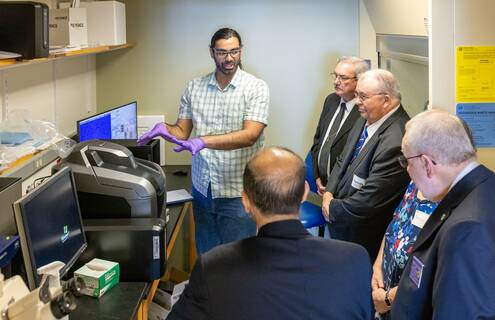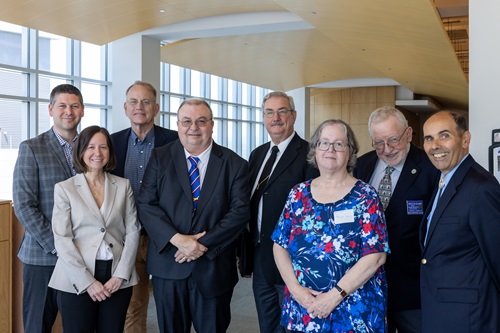
In 1967, Dartmouth Cancer Center (DCC) did not yet exist. But a budding cancer research program at Mary Hitchcock Memorial Hospital caught the attention of the Knights of the York Cross of Honour.
The Knights, members of the Convent General Knights of the York Cross of Honour, a Masonic organization, had recently established a Medical Research Foundation, and decided to support cancer research at Dartmouth through that foundation. The Knights gave their first gift—$300—in 1967. Thus began a long-standing partnership between researchers at Dartmouth Cancer Center and the Knights that continues to this day.
By the time the Cancer Center officially opened in 1972, the Knights’ philanthropy was well-established with the organization. To date, the Knights have given more than $2.4 million to support the institution’s most cutting-edge ideas in cancer treatment.
“Because of the Knights and philanthropy, we’ve been able to elevate Dartmouth Cancer Center on the national level,” says Steven D. Leach, MD, director of Dartmouth Cancer Center, the Preston T. and Virginia R. Kelsey Distinguished Chair in Cancer, and incoming interim dean and professor of molecular and systems biology at the Geisel School of Medicine at Dartmouth.
Through their annual donation, the Knights specifically sponsor a DCC researcher. For the past decade, they have been working with Mary Jo Turk, PhD, co-director of DCC’s Immunology and Cancer Immunotherapy Research Program and O. Ross McIntyre, MD, Endowed Professor at Geisel. Turk’s research focuses on generating long-standing, durable immune responses to cancer, particularly melanoma, a skin cancer that affects more than 100,000 people each year.
“Without their partnership in this research, it simply wouldn’t happen,” Turk says. “Their gifts plant the seeds that allow us to do the innovative high-risk work that will really move the field of immunotherapy forward.”
The Knights largely support the earliest stages of Turk’s research—when foundational discoveries can set the stage for revolutionary breakthroughs. This vital stage in the research process often doesn’t receive support through traditional funding streams, such as the National Institutes of Health (NIH), as those grants typically require researchers to demonstrate, with data, that a new idea has traction. So, Turk explains, the results from the research supported by the Knights can be hugely valuable in obtaining those traditional grants.
The Knights’ funding has supported the generation of datasets from melanoma and lung cancer patient immune cells. These datasets are shared with other labs across DCC and can be cited when other researchers apply for grants, too. This means that the impact of every philanthropic dollar from supporters like the Knights ultimately is multiplied across the entire institution.
The Knights’ support has gone well beyond the financial to become a true partnership. Representatives from the Knights visit DCC every year, with Turk and others traveling to the Knights’ annual meetings to discuss the latest advances.
In June, during the Knights’ annual visit to Lebanon, N.H., researchers in Turk’s laboratory showed the Knights T-cells (immune cells that the body uses to fight infection), under the microscope. T-cells are the focus of Turk’s work to revolutionize cancer treatment and leverage the body’s own defenses against the recurrence of cancer.

"I look forward to coming up here all year,” says James McGee, Grand Master General of the Knights, who traveled from his home in Alabama for the tour as part of the Knights contingent. “As Freemasons, we try to leave an imprint on society. Helping move immunotherapy forward is incumbent upon what we do as Masons, and I’m happy and honored to be a part of this, where we can see those dollars going to work to help fund the initial phases of a new thought.”
In addition to supporting Turk’s research, over the years the Knights have also partnered with other researchers and clinician-scientists, including Christopher Lowrey, MD, who developed new gene therapies for leukemia and sickle-cell disease before retiring.
“I see too many people dying from cancer,” says Earl W. Cole Jr., Grand Master of Cryptic Masons, who attended the June visit. “As a Mason, we’re here to help the community wherever we can. By working together [with Dartmouth Cancer Center], we’re able to continue to fight this.”